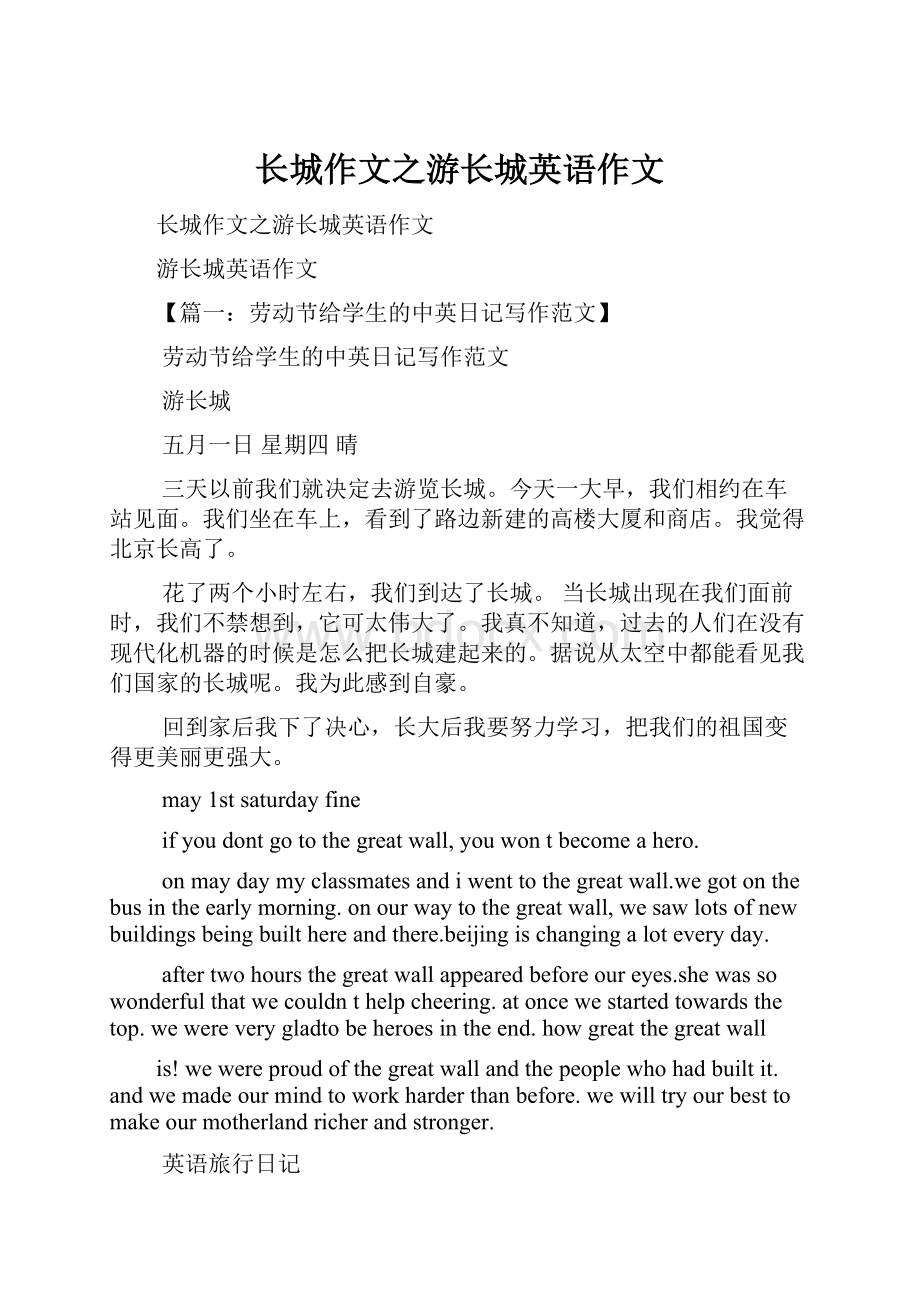长城作文之游长城英语作文.docx
《长城作文之游长城英语作文.docx》由会员分享,可在线阅读,更多相关《长城作文之游长城英语作文.docx(9页珍藏版)》请在冰豆网上搜索。

长城作文之游长城英语作文
长城作文之游长城英语作文
游长城英语作文
【篇一:
劳动节给学生的中英日记写作范文】
劳动节给学生的中英日记写作范文
游长城
五月一日星期四晴
三天以前我们就决定去游览长城。
今天一大早,我们相约在车站见面。
我们坐在车上,看到了路边新建的高楼大厦和商店。
我觉得北京长高了。
花了两个小时左右,我们到达了长城。
当长城出现在我们面前时,我们不禁想到,它可太伟大了。
我真不知道,过去的人们在没有现代化机器的时候是怎么把长城建起来的。
据说从太空中都能看见我们国家的长城呢。
我为此感到自豪。
回到家后我下了决心,长大后我要努力学习,把我们的祖国变得更美丽更强大。
may1stsaturdayfine
ifyoudontgotothegreatwall,youwontbecomeahero.
onmaydaymyclassmatesandiwenttothegreatwall.wegotonthebusintheearlymorning.onourwaytothegreatwall,wesawlotsofnewbuildingsbeingbuilthereandthere.beijingischangingaloteveryday.
aftertwohoursthegreatwallappearedbeforeoureyes.shewassowonderfulthatwecouldnthelpcheering.atoncewestartedtowardsthetop.wewereverygladtobeheroesintheend.howgreatthegreatwall
is!
wewereproudofthegreatwallandthepeoplewhohadbuiltit.andwemadeourmindtoworkharderthanbefore.wewilltryourbesttomakeourmotherlandricherandstronger.
英语旅行日记
我是一个美国学生,来中国旅游,去了长城、天安门等地方,词数不少于60个,注意要用过去式,开头已给出:
wednesday,august2nd
itwasafineday!
【篇二:
高考英语作文怎样才能稳拿高分?
】
高考英语作文怎样才能稳拿高分?
久伦教育高考专家赵久伦老师答疑解惑:
运用久伦高考英语全脑学习法,在3个月的时间内,完全可以确保高考英语作文获得28—32分(总分35分)得高考成绩。
久伦全脑学习法对高考作文归纳为:
选、背、默、改、写。
第一步选:
根据历年高考真题作文,按照各种不同题型和体裁,每种选出2-3篇经典范文。
第二步背:
运用久伦全脑学习法中的英语课文记忆方法,把所选的经典范文记,反复背诵5—10遍。
第三步默:
把背诵的文章重头到尾完全默写下来,默写的过程中一次也不要看原文。
默写完后检查修改到无法改进为止,然后对照原文,找出所有错误的地方用彩色笔把错误的地方修正,弄清楚错误的原因和正确的内容,按照正确的文章再次记忆,背诵5—10遍,然后再默写,再校对、再背诵、在默写,一直默写到与原文完全一致为止,在此基础上反复背诵到100—300遍。
第四步改:
在反复背诵的基础上,改写所背诵的文章,如你背了一篇游记,你可以再改写出一篇新的游记:
原文游长城、你改为游
颐和园,原文是夏天、你改为冬天,原文是晴天、你改为雨天,原文是和班里的同学、你改为和家人等等。
第五步写:
遇到任何事情或者你有任何想法的时候你都可以用英语在大脑中构思甚至用笔写下来。
如果你真能够做到以上五步,背诵
最少可以的28分。
5—8篇范文,你的高考作文
【篇三:
中考冲刺六书面表达重点句子】
中考冲刺六书面表达重点句子
目标认知:
从近年来的书面表达测试题来看,中考试题设计无论怎么变化,内容无论涉及什么话题,就其要表达的内容所需要的句子都是我们初中阶段的一些重点句子,只要同学们掌握了这些句子,做书面表达题就要顺利多了。
针对不同话题的书面表达题,掌握并灵活运用一些与话题相对应的基本句子会很有用。
本文对一些常见话题所用到的基本句型作了一些梳理和归纳,并对同学们在做书面表达时经常出现的错误句子进行解析,对基本句型的运用作些说明,以方便同学们复习。
精讲巧练
Ⅰ.个人情况介绍:
常用句子举例:
有关个人情况介绍的书面表达题一般需要描述人物的外貌、性格、爱好、对某事的观点等的句子。
1.i’magirlof15.i’mfrom/comefrom...
2.iamtall/short.ihavelong/shorthair.
3.iamquiet/moreoutgoingthantheotherboysinmyclass.
4.ihavelong/shortcurly/straighthair.
5.ihaveabig/smallmouth/nose./big/smalleyes.
6.i’matallboy/girlwithbigeyes/witharoundfaceandblackhair.
7.iamverycleveranddiligent.
8.icanspeakenglish/french/chineseandalittlejapanese.
9.myfavoritecolor/sports/subject/food/teacher/is?
because...
10.ioftenwearapairofglasses.
注意:
下面两个错句是最易出现的:
hecanspeakenglishandafewchinese.(chinese是不可数名词,用alittle修饰)
i/wefavoritesubjectisenglish.(受汉语影响,应该是my或our)
随时练:
假设你是betty,请你写一个邮件向新笔友sarah介绍一下你的情况。
包括姓名、性别、年龄、国家、所说语言、喜欢的东西(包括食物、科目、动物)等以及原因。
词数60左右。
【答案与解析】
电子邮件的基本格式一般都会给出,如果不给出的话,要注意。
dearsarah,
mynameisbetty.iamagirloffifteen.iamfromengland.icanspeakenglishandalittlechinese.myfavoritefoodisbread,becauseitisverydelicious.ilikeenglishandpebestofallsubjects,becausetheyareveryinteresting.myfavoriteanimalsarepandas.theyaretoocute.iwanttobeareporter.canyouwritesomethingaboutyourselftomesoon?
yours,
betty
Ⅱ.家庭成员、朋友或周围人的情况介绍:
常用句子举例:
1.thisismyfather/mother/brother/sister/friend/uncle/teacher.
2.theyaremyparents/myfatherandmother/mygrandfatherandgrandmother.
3.she/helooksyoung/old.
4.she/heistall/short/heavy/thin.
5.he/shehaslong/shortcurly/straighthair.
6.he/shelivesinshanghai.
7.he/shelikes/doesn’tlike/dislikesapples/bananas(watchingtv/walking).
8.heisapoliceman/worker/...
注意:
可能的错误表达:
1.thisismyfatherandmother.heismyfatherandmother.(注意应用复数)
2.heislookyoung/old.(look是动词,应用looks)
3.he/shelookyoung/old/beautiful.(同上)
4.heislonghair.hehasshot/fat.(受汉语影响,前句用has,后接名词;后句用is,后接形
容词)
随时练:
请写一个片段:
你的朋友田甜准备去英国,请你把她的基本情况介绍给你的笔友rita,希望他们成为
朋友,并希望rita能够去飞机场接她。
提示:
介绍田甜的年龄、外貌、性格和爱好......
【答案与解析】
介绍他人一定注意单数第三人称及必要的客套话。
dearrita,
howiseverythinggoing?
i’dliketointroducemybestfriend,tiantiantoyou.sheisalovelygirlwitharoundfaceandbigeye.sheisverykindandeasytogetalongwith.shelikesreadingandisespeciallygoodatplayingthepiano.herfavoritesubjectsarephysicsandchemistry.?
.
Ⅲ.周围的环境
常用句子举例:
1.wemustpaymoreattentiontoourenvironmentaroundus.
2.theenvironmentaroundusisbecomingworseandworse.
3.alotofriversandlakesarepollutedbypeople.
4.wesawmanypeoplethrowwastepapereverywhereandpourdirtywaterintotheriveror
lakearoundus.
5.everyoneshouldmakecontributiontoprotectingtheenvironmentaroundus.
6.weshouldtryourbesttomakeourenvironmentmoreandmorebeautiful.
7.it’sourdutytotakegoodofourenvironment.
8.ifeveryonemakesacontributiontoprotectingtheenvironment,theworldwillbecome
moreandmorebeautiful.
9.somethingmustbedonetostoppollutingourearth---ouronlyhome.
10.moretreesmustbeplanted.
11.weshouldn’tthrowrubbishabout/pickupflowers.
12.weshouldstopsupermarketsfromprovidingfreeplasticbags.
13.it’sharmfulforourhealth.
注意:
1.不能用moreandmoreclean,应该用cleanerandcleaner
2.此话题经常用被动语态,注意被动语态的构成。
随时练:
假如你是你们城市晚报的小记者,星期天和同学们一起参加“环保小卫士”活动。
请你
【答案与解析】
写过去的活动,要注意一般过去时的运用。
sundaysunnyitookpartinthe“environmentprotector”activitywithmyclassmatestoday.inthemorning,wewentthepeople’sparkbybus.whenwegotthere,wefoundthatsomechildrenwereclimbingthetrees.therewasalotofrubbishhereandthere.weadvisedthechildrennottoclimbthetrees,andtheirfacesturnedred.thenwebegantopickuprubbish.wealsoplantedalotoftrees.
it’sourdutytotakegoodofourenvironment.ifeveryonemakesacontributiontoprotectingtheenvironment,theworldwillbecomemoreandmorebeautiful.
Ⅳ.学习和生活
常用句子举例:
1.iusuallygetupatsixinthemorning.
2.ihavebreakfastwithmyparentsathomeeveryday.
3.mysisteroftengoestoschoolbybike/onfoot.
4.weusuallygotoschoolatseveninthemorning.
5.wehavealotofclasseseveryday.
wehavefourclassesinthemorningandtwointheafternoon.
6.iamdoingmyhomeworknow.mybrotherisn’tdoinghishomework.heiswatchingtv.
7.iliketheteacherswhoareveryfriendlytous.
8.wouldyoumindopeningthedoorforme?
couldyoupleaseturndownyourradio?
9.wehad/aregoingtohaveanexamyesterday/tomorrow.
10.igotuplatelastmorningandwaslateforschool.
注意:
在写关于学生的学习和生活方面的短文时,根据情景用对时态,如:
iamdoingmyhomework.不能忘掉am或者doing不加ing。
再如:
描述过去的生活片段,就要用一般过去时或有时可能用现在完成时。
随时练:
把下列的句子翻译成英语。
1.许多学生在学校做作业。
2.星期五我们上午只有三节课,下午没有课。
3.我到的时候,男孩子在看电视,女孩子在画画。
4.你能给我们讲故事吗?
5.他问我:
“我在这里吸烟你介意吗?
”
【答案与解析】
1.manystudentsdotheirhomeworkatschool.
2.onfriday,wehavethreeclassesinthemorning,andhavenoclassesintheafternoon.
3.whenigotthere,theboyswerewatchingtvandgirlsweredrawing.
4.couldyoupleasetellussomestories?
5.“wouldyoumindmysmokinghere?
”heaskedme.
Ⅴ.假期和旅游:
常用句子举例:
1.wehadabusy/great/wonderful/terriblevacationlastmonth.
2.wewenttoqinghaiforoursummervacationlastyear.
3.myfatherisgoingtonewyorkforvacationnextmonth.
4.theyspenttheirvacationwiththeirfriendslastweek.
5.wewanttogosomewherewarmforourvacation.
6.springfestivalisthemostimportantholidayinchina.
7.duringtheholiday,weareplanningtoclimbthemountainandlearnswimming.
8.wearegoingtovisitthegreatwallandsummerpalacenextvacation.
9.weenjoyedourselves/hadagoodtimethere.wehadfundoing...
随时练:
请以“游长城”为题写一个短文片段,字数80左右。
内容要点:
1.昨天是儿童节,我和同学们登上长城。
2.起床很早,乘公共汽车去长城,路上看到许多高楼大厦。
3....看到长城时的反应...
4.游览后的感想。
【答案与解析】
?
myclassmateandivisitedthegreatwall.wegotupearlyandtookabustothegreatwall.onthewaythere,wesawmanyhighbuildingsfirstandthenalotoftreesandhills.whenwesawthegreatwall,wecouldn’thelpcryingwithajoy,“whatagreatsight!
”?
wefeelveryproudtohavebeentothegreatwall.
Ⅵ.兴趣和爱好
常用句子举例:
1.my/your/his/herfavoritesports/color/movieis/are_______.
2.ilike/enjoyplayingtheguitar/piano/violin.ilike/lovetoplaycomputergames.
3.mysisterlikesplayingsoccer/basketball/volleyball.
4.heprefersstayingathomeandwatchingtvtogoingoutforawalk.